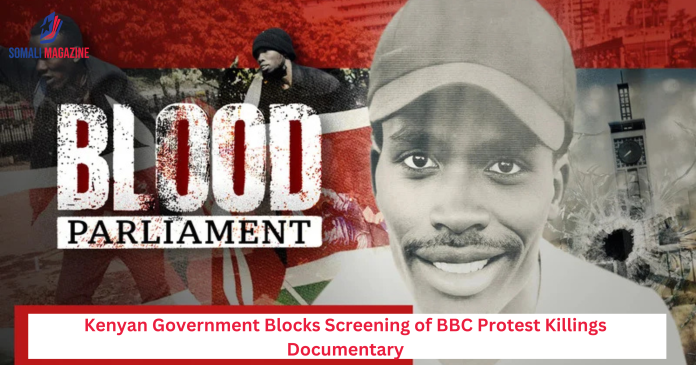Facebook Twitter (X) Instagram Somali Magazine - People's Magazine
BBC’s “Blood Parliament” links security officers to protester deaths during 2024 tax demonstrations — screening cancelled amid state pressure.
On Monday, the BBC said that pressure from the Kenyan government forced the cancellation of a planned screening in Nairobi for its new documentary, Blood Parliament. The film, produced by BBC Africa Eye, investigates the deadly police response to protests in Kenya last year.
In 2024, Kenya saw large youth-led protests against a proposed increase in taxes. These demonstrations turned deadly, with more than 60 people reportedly killed, according to human rights organizations. Many others were allegedly abducted by security forces in the months that followed.
Blood Parliament, which aired on BBC Africa Eye on Monday, focuses on a particularly violent day of the protests—June 25, 2024. On that day, demonstrators stormed Kenya’s parliament building in Nairobi in a bid to stop lawmakers from passing the tax bill. The documentary uses open-source footage and videos taken by the public to investigate what happened. It shows how three unarmed protesters were shot and killed by security officers in uniform right outside parliament.
The BBC had planned to hold a private screening of the documentary in an upscale cinema and rooftop bar in Nairobi. A panel discussion with activists featured in the film was also planned to follow the screening. However, a source from the BBC told the AFP news agency that the event had to be cancelled because of pressure from Kenyan authorities.
In a public statement, a BBC spokesperson confirmed this, saying, “A screening of BBC Africa Eye’s ‘Blood Parliament’ in Kenya was cancelled due to pressure from the authorities.”
The documentary has sparked a major debate online. Some Kenyans have praised it for exposing the truth, but others, including politicians, have reacted angrily. One Member of Parliament, George Peter Kaluma, went as far as calling for the BBC to be banned from operating in Kenya. “The relevant agencies of the Government of Kenya must act fast to withdraw @BBCAfrica license in Kenya,” he posted on X (formerly Twitter).
Despite the footage and public concern, the police have continued to deny any involvement in the killings or abductions of protesters. So far, no police officers have been charged in connection with the events.
On the same day the documentary aired, the Independent Policing Oversight Authority (IPOA) released an update on its investigation into the protests. According to the report, of the 60 deaths being looked into, 41 were due to gunshot wounds. IPOA also said they are currently working on 36 active investigations, have completed 22, and have taken two cases to court.
In addition to the deaths, IPOA reported that 233 people were injured during the demonstrations. The authority did not confirm whether any of the injuries or deaths were directly linked to police action, but the report highlights the severity of the violence during the protests.
The documentary and its cancellation have drawn attention to the challenges of holding powerful institutions accountable in Kenya. While some see Blood Parliament as a necessary step in seeking justice for the victims, others view it as foreign interference.
As debate continues, many Kenyans are left wondering if justice will ever be served for those who lost their lives or were injured during the protests. For now, Blood Parliament remains available online, where it continues to stir strong reactions from both the public and the government.
Would you like this summary turned into a visual grap

